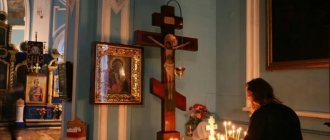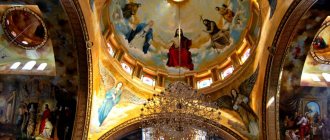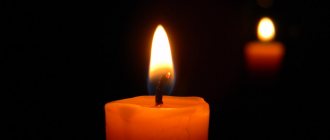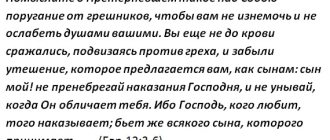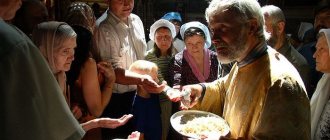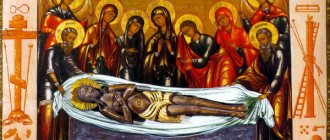The most pressing questions
Photo: Pravlife.org
New Orthodox Christians often ask: is it enough to attend Sunday services or should you go to church more often? Or another formulation of this question: do people attend church when a spiritual need arises, and without this, visiting church would be an empty formality that no one needs?
But the answer to these questions will be so harsh that it gives reason to think not only about inexperienced people, but also about those who already have a certain baggage of church life.
About the problem in essence
For what reasons can a person miss Sunday worship? The first is if he is sick. Everything is clear here: we care about our well-being and the health of our neighbors.
The second is if he works and has no control over his schedule.
The third is if he is caring for a sick person. These could be frail parents, sick children, relatives.
The fourth is if some emergency has happened that requires a solution here and now, or if a person has become a victim of circumstances: the water has broken, the key has broken, and so on.
In other cases, if a Christian has a day off on Sunday and has the opportunity to manage his time, he is obliged to be at the service. Why is that? Let's figure out why we have many baptized people, but few people who regularly attend church.
What happens to a person while visiting a temple?
Photo: Pravlife.org
It is worth considering that our Church, in its content, is a divine-human organism living a constant and deeply spiritual life. Coming to Orthodoxy, all people become cells of this organism, its constituent parts. And it is no longer possible to live a spiritual life outside of this system, just as a cell of the human body cannot survive being separated from the body.
The meaning of the entire existence of the Church is so great and global that it captures its spirit after understanding its mission: the liberation of all mankind from the slavery of the devil and the return to life according to the commandments of God.
If a person is baptized, he constantly remains with God, renouncing the devil during Holy Baptism. And you don't have to wait for some special occasion, inspiration or spiritual itch to go to the temple. You should strive to come there every minute, distracting yourself from communication with the Lord only by earthly matters - study, work, family and earning your daily bread. That is, the answer is in the opposite plane of the question: Christians should not be distracted from earthly affairs, and not from the temple. And vice versa: to be distracted from God when necessary in earthly affairs, but in the soul always, in all matters, turn to Him for help and support.
If the need for God is absent most of the time, reminders of the need for spiritual work come only occasionally, then this condition is clearly indicated in the Bible and is called “spiritual death.” And this is much worse than physical death. No one takes the money, things, gadgets they earn with them to another world. A person is there only with the spiritual baggage that he has accumulated over his life, having worked hard for this and invested a lot of effort into it.
After all, no one is paid such a salary just because a person is listed in the organization as an employee. No, he is doing his duty. Likewise, spiritual gifts are not given without difficulty simply for membership in the Holy Church. They need to be earned in order to earn wealth for your soul: good deeds, life according to God’s commandments, prayer, fasting. These things are necessary because they were exactly what Jesus Christ, the founder of our Church, did during his life on earth. And we must, to the best of our ability, imitate this, as the greatest and only example.
And this journey to the salvation of our immortal soul should not be intermittent, but only through a continuous ascent along the ladder of perfection and faith.
Questions encountered in parish counseling practice and answers to them
1
. Bible. Books of the Holy Scriptures of the Old and New Testaments. M.: Russian Bible Society. 2002. – 1376 p.
2
. God's Law. Compiled by Archpriest Seraphim Slobodskoy. St. Petersburg Brotherhood of the New Martyr Archbishop Hilarion of Vereisky, 2000. – 724 p.
3
. The Law of God, compiled according to the Holy Scriptures and the sayings of the Holy Fathers, as a practical guide to spiritual life. M.: Sretensky Monastery; A new book; Kovcheg, 2004. – 704 p.
4
. Explanatory Typikon. Explanatory presentation of the Typikon. Compiled by Professor of the Kyiv Theological Academy Mikhail Skaballanovich. M.: Publication of the Sretensky Monastery, 2004. – 816 p.
5
. Bulgakov S.V. Handbook for priests and church ministers. (Reprint of the 1913 edition). Publishing department of the Moscow Patriarchate, 1993. – 1772 p.
6
. Priest K. Subbotin. A guide to the study of the Charter of Divine Services of the Orthodox Church. Kyiv. Society of lovers of Orthodox literature. Publishing house named after St. Leo, Pope of Rome, 2007. – 360 p.
7
. Priest A. Kremlevsky. Fundamentals of Orthodox dogma. Holy Trinity Sergius Lavra, 2001. – 208 p.
8
. Explanations to the Sacraments of the Orthodox Church. St. Petersburg: Satis, 2003. – 128 p.
9
. Explanation of the Liturgy in questions and answers. M.: Blago, 2006. – 48 p.
10
. About Orthodoxy for beginners. Kyiv. Printing house of the Kiev-Pechersk Lavra, 2005. – 96 p.
11
. Basics of Orthodoxy. Holy Dormition Pochaev Lavra, 2001. – 96 p.
12
. The very first steps in the temple. Advice for a beginning Christian. M.: Publishing house of the sisterhood in the name of St. Ignatius Brianchaninov, 2006. – 224 p.
13
. First steps in an Orthodox church. M.: Publication of the Orthodox Brotherhood in the Name of the Exaltation of the Honest and Life-Giving Cross of the Lord, 1999. – 64 p.
14
. Priest M. Shpolyansky. We enter the temple. A practical guide on the way to church. Publishing house Obraz, M.: 2005. – 128 p.
15
. Shchegoleva E., Glagoleva O. In the Orthodox Church. – M.: OLMA Media Group; OLMA-PRESS, 2006. – 304 p.
16
. Deacon Alexy. Evgeny Sanin. Advice for those going to Church. M.: Orthodox Brotherhood of the Holy Apostle John the Theologian, 2000. – 62 p.
17
. What a Christian should know. Saratov. Saratov public charitable organization “Blagovestnik”, 1999. – 112 p.
18
. About “bread” and “water” in the life of the Church. M.: Publishing house of the Holy Trinity Sergius Lavra, M.: 1997. – 30 p.
19
. What you need to know about holy water. M.: Sretensky Monastery; New book, 1999. – 32 p.
20
. Kazakov O.A. About holy water and prosphora, about oil and incense. St. Petersburg: Satis, 2005. – 48 p.
21
. Instructions for the Orthodox layman about the church candle. – M.: Moscow courtyard of the Holy Trinity Sergius Lavra; New book, 1996. – 32 p.
22
. About the Sacrament of Baptism. M.: Blagovest, 2003. – 32 p.
23
. How to prepare for Communion. Minsk: JSC “Orthodox Initiative”, 2004. – 32 p.
24
. What you need to know about the Sacrament of Unction. / Prepared from the book of Archpriest Mikhail Arkhangelsky “On the Mystery of St. Oil. A study on the historical development of the rite of the Blessing of Anointing.” Edinet-Brichany Diocese. Kaluga, “Kaluga Standards Printing House”, 2004. – 64 p.
25
. The Sacrament of Anointing: - M.: Filaret Publishing House, 2005. - 56 p.
26
. How to correctly submit notes “On health” and “On repose”. M.: Sretensky Monastery; New book, 1999. – 32 p.
27
. S. Alekseev. How to arrange a home iconostasis. St. Petersburg: Satis; Power, 2003. – 32 p.
28
. How to pray correctly according to the teachings of the Holy Fathers. M.: Blago, 2002. – 32 p.
29
. How to accustom yourself to fasting. – M.: Sretensky Monastery; A new book; “Ark”, 1999. – 64 p.
30
. Why is it necessary to get married? Minsk: Orthodox Initiative, 2005. – 64 p.
31
. What name to choose for a newborn. M.: Blago, 2005. – 32 p.
32
. How to behave in a cemetery. Practical advice on behavior in the cemetery and commemoration of the dead. The rite of litia, performed by a layman at home and in the cemetery. Akathist about the repose of the dead. M.: Sretensky Monastery; New book, 1997. – 48 p.
33
. About the end of the world. The brochure is compiled according to the Pskov-Pechersk leaflets Nos. 204, 209 with additions from the correspondence of the elders of the monastery with their spiritual children. M.: Father's House, 2000. – 80 p.
34
. Archpriest Valentin Mordasov. Notebooks of an experienced confessor. Moldova. Edinet-Brichany diocese, 2006. – 160 p.
35
. What should we sinners do? M.: Publishing house Danilovsky Blagovestnik, 1994. – 80 p.
36
. Spiritual life begins with repentance. Hieromonk Sergius (Rybko). M.: Publishing house named after. St. Ignatius Brianchaninov, 2003. – 416 p.
37
. Archimandrite Ambrose Yurasov. About faith and salvation. Questions and answers. Ivanovo. Ivanovskaya newspaper, 1996. – 286 p.
38
. Answers to 1140 questions about spiritual life. M.: 1994. – 240 p.
39
. Soul healer. Holy Fathers - to the laity. M.: Publishing house of the sisterhood in the name of St. Ignatius of Stavropol, 2006. – 184 p.
40
. Sablina N.P. Words under titles. St. Petersburg: Izhitsa, 2001. – 44 p.
41
. Uspensky L.A. Theology of the icon of the Orthodox Church. Pereslavl: Publishing house of the brotherhood in the name of the holy prince Alexander Nevsky. 1997.– 656 p.
42
. One hundred fifty-three questions for the priest. Comp. O.A. Kazakov. St. Petersburg: Satis, 2006. – 64 p.
43
. ABOUT FEAR: True and false fear. M.: Danilovsky blagovestnik, 2007. – 320 p.
44
. Handbook of an Orthodox person: Orthodox Church. M.: Danilovsky Blagovestnik, 2007. Part I – 128 p.
45
. Archpriest Alexander Torik. CHURCHING: for beginners in church life. M.: Siberian Blagozvonnitsa, 2007. – 64 p.
46
. Book of Hours. Ukrainian Orthodox Church. Vinnitsa diocese, 2001. – 352 p.
47
. Saint Theophan the Recluse. Interpretation of psalms six psalms three and thirty-seven. M.: Publishing house named after. St. Ignatius Brianchaninov, 2002. – 64 p.
48
. Shimansky G.I. LITURGICS: Sacraments and rituals. M.: Publication of the Sretensky Monastery, 2003. – 352 p.
49
. Leaflet with an article by Yu. Ruban “Agiasma”. Cultural and educational at the Church of the Icon of the Mother of God “Joy of All Who Sorrow” on Shpalernaya Street.
50
. Archbishop Averky Taushev. Four Gospels. Apostle. A Guide to Studying the Holy Scriptures of the New Testament. M.: Orthodox St. Tikhon's Theological Institute, 2003. – 848 p.
51
. Missionary leaflets. Missionary department of the St. Petersburg diocese of the Russian Orthodox Church.
52
.
Priest Mikhail Trukhanov. About Scripture making wise for salvation ( about the meaning for an Orthodox Christian of reading the Holy Scriptures).
Kyiv: Publishing house named after. St. Leo the Great, 2000. – 32 p.
53
. About superstitions, prejudices and modern religious ignorance. M.: Blago Publishing House, 2002. – 112 p.
54
. V. Dukhanin. What do we believe? 100 answers to a contemporary. M.: Publishing Council of the Russian Orthodox Church, 2008. – 256 p.
55
. Bogolyubov D.I. Orthodox anti-sectarian catechism. St. Petersburg: Satis, 1994. – 112 p.
56
. Schema-abbot Savva. Spiritual ABC. M.: Orthodox Brotherhood of the Holy Apostle John the Theologian, 2004. – 78 p.
57
. Heal me, O God...: The Sacrament of Unction. Comp. G.N. Stromynsky. M.: Lepta Book, 2008. – 96 p.
58
. Priest Oleg Davydenkov. Catechism. Introduction to Dogmatic Theology. M.: Publishing house of the Orthodox St. Tikhon's Theological Institute, 2000. – 232 p.
59
. Archpriest Vladimir Goffman. The art of being a Christian. Answers to questions from parishioners. N. Novgorod: Publishing house of NP PC “Glagol”, 2007. – 192 p.
60
. Trostnikova E.V. Holidays of the Orthodox Church. M.: Eksmo, 2008. – 304 p.
61
. Hegumen Peter (Meshcherinov). Church and modernity. Questions and answers. K.: Orthodox Book Center, 2008. – 272 p.
62
.
Internet. Lectures by professor MDA Osipov A.I. In the preparation of educational and methodological manuals under the leadership of
the Chairman of the Department of Religious Education and Spiritual Enlightenment of the St. Petersburg Diocese, Archpriest Alexander Zelenenko
participated:
Deacon Konstantin Gorbunov, head of the parish advisory service of the Church of the Holy Prophet Elijah on Porokhov, St. Petersburg diocese
Krasnozhon O.V., Kuznetsova I.I., duty officers of the parish advisory service of the Church of the Savior of the Image Not Made by Hands in Pargolovo, St. Petersburg Diocese
Moiseeva A.G., employee of the Department of Religious Education and Spiritual Enlightenment of the St. Petersburg Diocese
Thank you for your help in preparing the second edition:
priest Grigory Antipenko, deacon Oleg Alekseev, Zavyalova S.Yu., Kontsevaya N.I., Pivovarova G.R., Andreenko G.A.
Prayer in the temple
Photo: Semyaivera.ru
In addition to all of the above, it is necessary to visit the temple as often as possible so that prayers reach the Lord if they are sincere and full of faith. It is not without reason that the Gospel quotes the words of the Lord: “Where two or three are gathered in My name, I am among them.” But if a believer prays at home alone, he sends his prayer alone. So it is no better to go to a church where dozens of believers simultaneously send their words to God, creating a powerful flow, overshadowed by the Holy Spirit, who invariably resides in the temple.
And do not forget that prayers are offered there not only for yourself and your loved ones, but also for the Fatherland, for all Orthodox Christians and the dead, for the well-being of our Fatherland, for the unity and prosperity of the Church of Jesus. Priests ordained in accordance with all existing canons have the ability, conferred on them by the Holy Spirit, to send more powerful prayers. And in combination with their words addressed to the Lord, the words of parishioners acquire special power.
Remember your neighbors
If a person does not understand all of the above, of course, he will not see the point in visiting the temple and worship services. Then it will be enough for him to visit them several times a year - on major holidays, for example. But there is another extreme: some Christians are so afraid of missing the service that they go to church even when they are sick. Of course, this is wrong, because such a person becomes a source of infection for other people. It’s good if he follows all the rules of protection - wears a mask and gloves - but still the best decision would be to stay at home. Many believers, when they are sick, want to take communion for the health of their souls and bodies. This is understandable, but we should not forget that for this it is not necessary to go sick to church. You can negotiate with the priest and he will give you communion at home. This is much better than infecting both the priest and the parishioners.
I know that during the pandemic, many protested against various quarantine measures and did not understand why the Church demanded their implementation. However, this position of the Church is not new. Precautionary measures when communicating with sick people were already in the distant past - for example, Saint Nicodemus the Svyatogorets wrote about this. Even in the time of Christ it was the practice to separate the sick from the healthy. For example, patients with leprosy, which could not be treated at that time, were kept separately. Moreover: it was the priest who decided whether a person could be in the company of other people, and this was normal. Let us remember the episode when the Savior healed lepers and told them to go see the priest - this is how He fulfilled the demands of that time. Now there are also diseases that require a serious attitude, and not excessive arrogance and hope in God, which in fact turns out to be an attempt to tempt Him.
Are there situations when a sick person needs to encourage himself to go to church? - yes, if he has any problems with his mental state: depression, anxiety, fears, worries. Often such people calm down in church. You should also definitely go to work if you are in a state of anger, lack of peace, or worries about problems.
Confession and communion - only in church
Photo: Vziskanie.cerkov.ru
God is always with us, he lives in believers at home, at work and in church. But it enters people’s bodies through Holy Communion, which is celebrated only in churches after the Liturgy. Healing of physical ailments and mental illness occurs through this sacred rite. But it can only be obtained after confession, repentance, which only the priest will accept. Where can you repent if not in church? And this is one of the main reasons to come there more often and cleanse your soul, get rid of the dirt that has accumulated in it.
Why don't you want to go to church?
Photo: Pokrovkop.cerkov.ru
There are also people who feel as if something or someone is not allowed into the church, but during the service they feel out of breath, ill, and uncomfortable. Of course, this does not mean spiritual health. Many of these cases are described in the literature, which indicate that the devil, who has taken up residence in a sinful soul, does not want to leave the place where he is fed every day with passions, sinful habits, indulging his lusts and disgusting actions. He fights with all his might for such a manger, not allowing his master’s soul to be cleansed in the church and turn to the Lord.
As a result, it turns out that someone who has pumped up the muscles of the body, who knows how to drink a bottle of vodka at a time, smoke a pack of cigarettes a day, considering himself capable of not such “feats,” cannot stand spending half an hour in prayer. Demons do not give him peace; they drive him out, forcing him to abandon the prayer service. If a person realizes this, he will be saved. If he is led by the devil, he will perish. This is a complete alternative.

